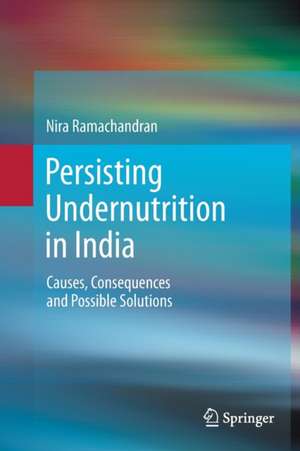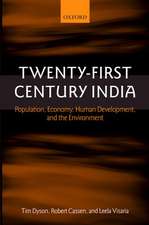Persisting Undernutrition in India: Causes, Consequences and Possible Solutions
Autor Nira Ramachandranen Limba Engleză Paperback – 3 sep 2016
| Toate formatele și edițiile | Preț | Express |
|---|---|---|
| Paperback (1) | 714.46 lei 6-8 săpt. | |
| Springer India – 3 sep 2016 | 714.46 lei 6-8 săpt. | |
| Hardback (1) | 721.40 lei 6-8 săpt. | |
| Springer India – 5 mai 2014 | 721.40 lei 6-8 săpt. |
Preț: 714.46 lei
Preț vechi: 752.06 lei
-5% Nou
Puncte Express: 1072
Preț estimativ în valută:
136.71€ • 143.03$ • 113.57£
136.71€ • 143.03$ • 113.57£
Carte tipărită la comandă
Livrare economică 02-16 aprilie
Preluare comenzi: 021 569.72.76
Specificații
ISBN-13: 9788132229308
ISBN-10: 8132229304
Pagini: 266
Ilustrații: XXV, 241 p. 41 illus.
Dimensiuni: 155 x 235 x 14 mm
Greutate: 0.39 kg
Ediția:Softcover reprint of the original 1st ed. 2014
Editura: Springer India
Colecția Springer
Locul publicării:New Delhi, India
ISBN-10: 8132229304
Pagini: 266
Ilustrații: XXV, 241 p. 41 illus.
Dimensiuni: 155 x 235 x 14 mm
Greutate: 0.39 kg
Ediția:Softcover reprint of the original 1st ed. 2014
Editura: Springer India
Colecția Springer
Locul publicării:New Delhi, India
Cuprins
PART I: INTRODUCTION.- The Background.- Changing Calorie Consumption and Dietary Patterns.- PART II: ISSUES AND CONCERNS.- Does Gender still Determine Nutrition Status.- The Costs of Persisting Adult Under nutrition.- Why Child Under nutrition Persists in India.- Exploring Child Under nutrition Further: Best and Worst Case Scenarios.- The Additional Burden of Anaemia.- Do Nutrition Interventions Work in the Field? Reality Check.- Factoring in Climate Change.- PART III: IN SEARCH OF SOLUTIONS.- A Family Based Approach to Nutrition.- Making the ICDS Effective.- Lessons from International Experience.- PART IV: CONCLUSIONS.- Fast Tracking Nutritional Improvements in India.
Recenzii
“It is a text that gives a very clear picture of India’s health and nutrition problem, offering at the same time some suggestions to remedy the situation. … it should be read and consulted by all those who are concerned with health and nutrition of our nation. For students specialising in health and nutrition, the book could be ready reference for the Indian situation. … A well written good book, highly recommended.” (Dr. Jutta Dikshit, Transactions, Vol. 37 (2), 2015)
Notă biografică
Nira Ramachandran is an independent development consultant and Director, Research and Training, Bhoovigyan Vikas Foundation (Earth Care Foundation), New Delhi, India. This book was written during her tenure as Senior Fellow, Indian Council of Social Science Research (ICSSR) at the Institute of Economic Growth, New Delhi.
Textul de pe ultima copertă
The book revisits the causes of persisting undernutrition in India, but moves away from the usual focus on women and children to a broader view of the entire population. It estimates the economic losses resulting from ignoring undernutrition in the adult working population, and questions the current narrow focus of nutrition interventions, suggesting that a family-based approach may provide quicker results and long-term sustainability. It compares the best and worst performing states in the country to glean learnings from both successes and failures and emphasizes the need to hand over the ownership of nutrition outcomes from the state to the community and family for more sustainable results. The book is organized in three sections: Part 1 details the nutrition status of the population, regional variations in nutrition outcomes, and government response in terms of interventions. Part 2 reviews issues and concerns like gender discrimination, poor child nutrition status, ineffective implementation of government programmes in the field, and the possible impacts of emerging issues like climate change. Part 3 seeks solutions from both international and country experiences.
Caracteristici
One of the few books on undernutrition in India Addresses the causes and impacts of undernutrition in both child and adult populations Looks at gender disparities in nutrition from both sides of the equation Includes supplementary material: sn.pub/extras















